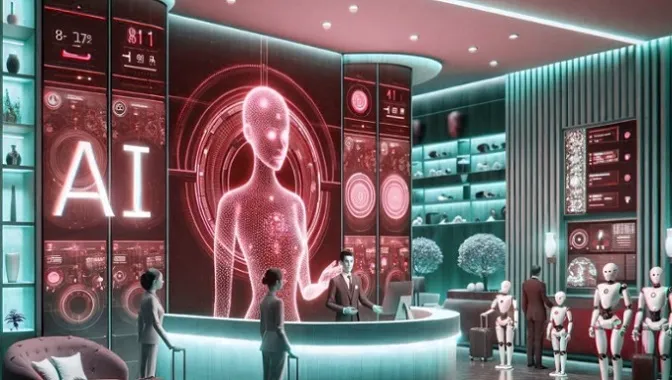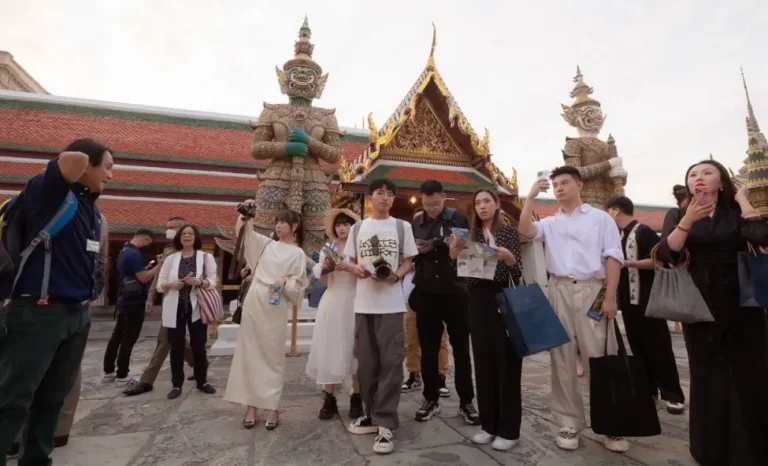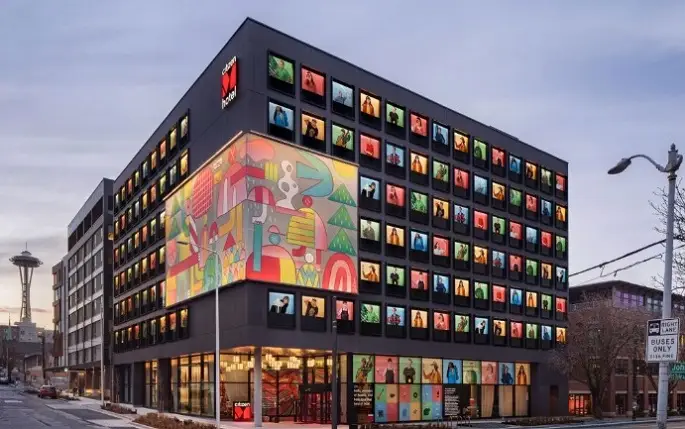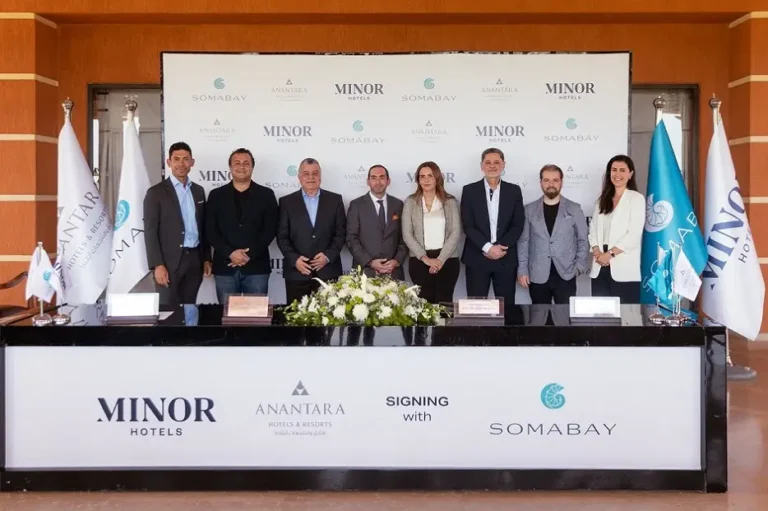
Bangkok Hotel Technology News: Across the globe, artificial intelligence is no longer a futuristic concept confined to tech expos and Silicon Valley labs. It has become a central force in revolutionizing industries, and the hospitality sector is among those experiencing the most profound transformations. From how guests are greeted to how hotels manage their operations behind the scenes, AI is not only disrupting conventional service models but also redefining the very nature of luxury and convenience.

Image Credit: AI-Generated (Gemini)
As AI-related technologies rapidly gain traction, it’s important for hoteliers to stay updated with the changes. This Bangkok Hotel Technology News report explores how AI is evolving from an optional add-on into an operational necessity—positioned squarely at the intersection of personalization, automation and enhanced efficiency. At the heart of this transformation are two key domains: guest-facing innovation and back-end operational optimization.
Guest Personalization is the New Standard
Travelers today no longer settle for basic amenities or cookie-cutter experiences. AI is enabling hotels to deliver deeply personalized guest journeys, crafted from real-time data analysis and machine learning. These systems examine guest behavior, preferences, and even social media activity to anticipate what travelers want—sometimes even before they ask.
Otonomus Hotel in Las Vegas, set to open later this year, serves as a shining example. Marketed as the first fully AI-powered hotel in the United States, it introduces cutting-edge personalization features, including digital twin avatars, gamified onboarding experiences and real-time customization of room features such as lighting, temperature and even scent.
The hotel’s attribute-based booking system allows guests to tailor their stay down to precise details like room proximity to amenities or noise levels, while AI tracks energy consumption and rewards eco-conscious guests with discounts.
This innovation signals the beginning of a larger shift. As one spokesperson from Otonomus Hotel put it, “The days of the one-size-fits-all experience in hospitality are really antiquated.” In today’s landscape, the ability to provide hyper-customization is quickly becoming not just a luxury—but a fundamental expectation.
AI Assistants and Digital Workers Are Becoming the Norm
AI is also revolutionizing the human interaction model in hotels. Intelligent assistants have evolved beyond the primitive chatbots of the early 2010s. Today, sophisticated AI agents are capable of managing everything from booking confirmations and concierge inquiries to multilingual customer support, and they’re available 24/7.
What’s more, many hotels are experimenting with fully automated front desks and reservation systems, integrating AI to handle peak-time customer requests seamlessly. Some industry analysts even suggest that human interaction may eventually become a premium experience—an upgrade reserved for VIP guests, while AI handles the bulk of day-to-day operations.
That said, hospitality experts warn against an overreliance on machines. The optimal approach, they argue, is not to replace humans but to augment them. In the words of one expert, “The AI revolution is here. Instead of fighting it, it’s about finding harmony with it.” Indeed, speed and efficiency are crucial, but warmth, empathy and intuition remain irreplaceable components of guest satisfaction.
Behind the Scenes AI is Quietly Reshaping Hotel Operations
Beyond front-of-house glamor, AI is also becoming the unsung hero of hotel operations. Revenue management, once a manually intensive task, is now being handled by AI systems that process demand patterns, competitor pricing, booking behaviors and market trends in real time. The result? Dynamic pricing models that maximize occupancy and revenue without human guesswork.
Even travel marketing is undergoing a seismic shift. Consumers are increasingly turning to AI tools like ChatGPT, Claude and Perplexity to plan their holidays, with about 30% of travelers saying they now rely on such tools for trip planning. These platforms offer direct booking links, enabling hotels to bypass third-party online travel agencies and reclaim direct customer relationships.
AI’s ability to analyze and personalize recommendations in real time has also prompted platforms like Perplexity AI to shift toward cost-per-thousand impressions (CPM) pricing models—reflecting a broader evolution in how marketing value is measured and delivered in the digital realm.
Getting Ready for the AI Algorithm Era
To truly benefit from AI, hotels must rethink their digital footprint. This means much more than just having a website—it means optimizing for AI algorithms. Content needs to be conversational, mirroring real guest questions. Websites must have SEO- and AIO-friendly structures that help AI tools understand and display relevant information.
Key optimization strategies include:
-Maintaining active profiles on Google, OTAs and TripAdvisor
-Incorporating FAQ pages that reflect real customer queries
-Leveraging and responding to user-generated reviews
-Feeding real-time pricing and availability to AI-driven search tools
As one industry voice put it: “Hoteliers must make their websites SEO and AIO friendly, or they risk being overshadowed by more data-rich competitors.”
Automation in Housekeeping and Maintenance
Automation isn’t just limited to bookings or check-ins. Predictive AI systems are now used in hotel maintenance, identifying and preventing system failures before they occur. Robots are used to clean rooms and public spaces faster than humans—housekeeping bots reportedly clean guest rooms 20% faster and public areas up to 80% faster.
Administrative tasks such as billing, inventory, waste management and energy monitoring are also increasingly AI-powered. The key challenge, however, is defining which roles should be automated and which require human finesse. The industry is still navigating how to strike this delicate balance.
Balancing Data and Human Connection
A foundational challenge remains: data readiness. Many hotels still rely on outdated legacy Property Management Systems (PMS) that struggle to integrate with modern AI platforms. Instead of revamping systems, some hotels pile on plugins and add-ons, leading to bloated tech stacks with minimal payoff.
For hotels to fully harness AI potential, they need to:
-Audit current tech infrastructure and readiness
-Invest in cloud-based, scalable data ecosystems
-Train employees to collaborate with AI tools
-Implement transparent and ethical data policies
Data collaboration across travel sectors is also emerging as a key trend. Imagine if a delayed flight could trigger automatic rescheduling of your hotel check-in and car rental—this kind of cross-platform synchronization is exactly what AI ecosystems aim to deliver.
Service Gaps and the Role of AI in Emotional Intelligence
A recent study led by Professor Anna Mattila from the Penn State School of Hospitality Management offers further insight into how AI can bridge the longstanding “service gap” in hospitality.
The research identifies four key gaps: listening, service design, performance and communication.
AI has the potential to narrow each of these gaps—if it can properly interpret and respond to human emotions. However, the study emphasizes that AI lacks emotional intelligence, which can result in perceived insincerity or poor service. In luxury settings, this emotional disconnect can be particularly jarring.
Mattila’s research highlights the importance of tailoring AI use according to service level. A midscale hotel may benefit greatly from automated processes, whereas a high-end property might lose its charm without meaningful human interaction.
The Path Ahead for AI in Hospitality
The journey toward AI integration in hospitality is not about erasing humanity from the guest experience but about enhancing it with speed, precision and intelligence. AI is already transforming the sector, from the way travelers plan their journeys to how hotels manage their resources. Those who embrace it thoughtfully—balancing smart automation with authentic human care—will be the pioneers of tomorrow’s hotel landscape.
Whether it’s optimizing bookings, enriching personalization or enabling seamless communication, AI’s role in hospitality is no longer optional—it is foundational.
But it’s the human elements—empathy, creativity, intuition—that will continue to elevate the guest experience beyond algorithms. The hotels that strike this balance best will not only survive the AI revolution—they’ll lead it.
For the latest Bangkok Hotel Technology News, keep on logging to Bangkok Hotel News.





